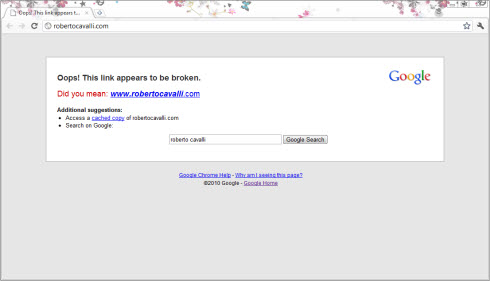Social Media Won’t Save Fashion’s Idiot Savants

The error page displayed when typing in robertocavalli.com from Google Chrome. That is not gifted.
L2, a luxury think tank focusing on digital innovation, recently published their second annual Digital IQ index, a ranking of luxury brands’ online initiatives. It’s a balanced report that takes into account things like the brand website, online marketing, social media presence and influence, and mobile offerings.
So it’s no surprise to see brands like Burberry, who took hits from critics for their strong internet engagement, labeled as digital “geniuses.” Ralph Lauren, one of the first fashion labels with a dedicated mobile shop, and Coach, who’ve been aggressively pursuing blogger and social media engagement, also understandably fall into the genius category. Louis Vuitton’s site isn’t the best for search, but there’s a real commitment to online content via Nowness and Gucci’s relaunched digital flagship takes advantage of HTML5 to mostly replace an overdependence on Flash that still hobbles many fashion brand websites.
While the exact order of the top 10 or so sites could be up for discussion, they seem to be fairly accurately positioned. Past the top 10, however, things get strange and seem to prop up some of fashion’s idiot savants. Brands who offer beautiful products that generate buzz and desire, but fail at the basics: an attractive website that’s accessible to users across various devices.
Imran Amed, editor of the Business of Fashion, points out that Chanel – ranked number 11 and classified as “gifted,” has extremely limited e-commerce (fragrance and beauty products in the US only). Perhaps 10 years ago, e-commerce would be an innovative “extra,” but in 2010 we’re well past maturity for online shopping. Overlooking that does seem a bit odd. Christian Louboutin, whose slow, Flash-heavy site (not viewable on the iPad, iPhone and many mobile devices) drags on a high-speed internet connection with not one, but two kitschy intros, recently launched e-commerce. Unfortunately, it’s difficult to find from the homepage (if you’re patient enough to give it the 2 minutes or so it takes to load), not to mention the fact that counterfeiters are still doing e-commerce and social media better than the brand itself. The online store doesn’t appear in a search for “Christian Louboutin” on Google or Bing in either the paid or unpaid sections, and YouTube videos haven’t changed that. That they’re classified in the same category as Calvin Klein, who along with QR-code billboards that bridge mobile and offline marketing, has livestreamed shows and made obvious integrated efforts with Facebook and social media is frankly a disservice to both brands.
Roberto Cavalli, who can’t figure out how to do a simple redirect (type in robertocavalli.com without the www. and you end up with a 404 page not found message), is the lowest “gifted” brand, but really? This is what we’re letting pass as gifted?
Social media, and thousands or even millions of followers can’t excuse or make up for a dated website lacking basic functionality. The Digital IQ index is needed, and a good step towards getting brands to put some effort into their online efforts. Rewarding the companies who are failing at the basics with extra credit for playing well with others (via social media) won’t help change the fact that they’re failing at the online basics though.
